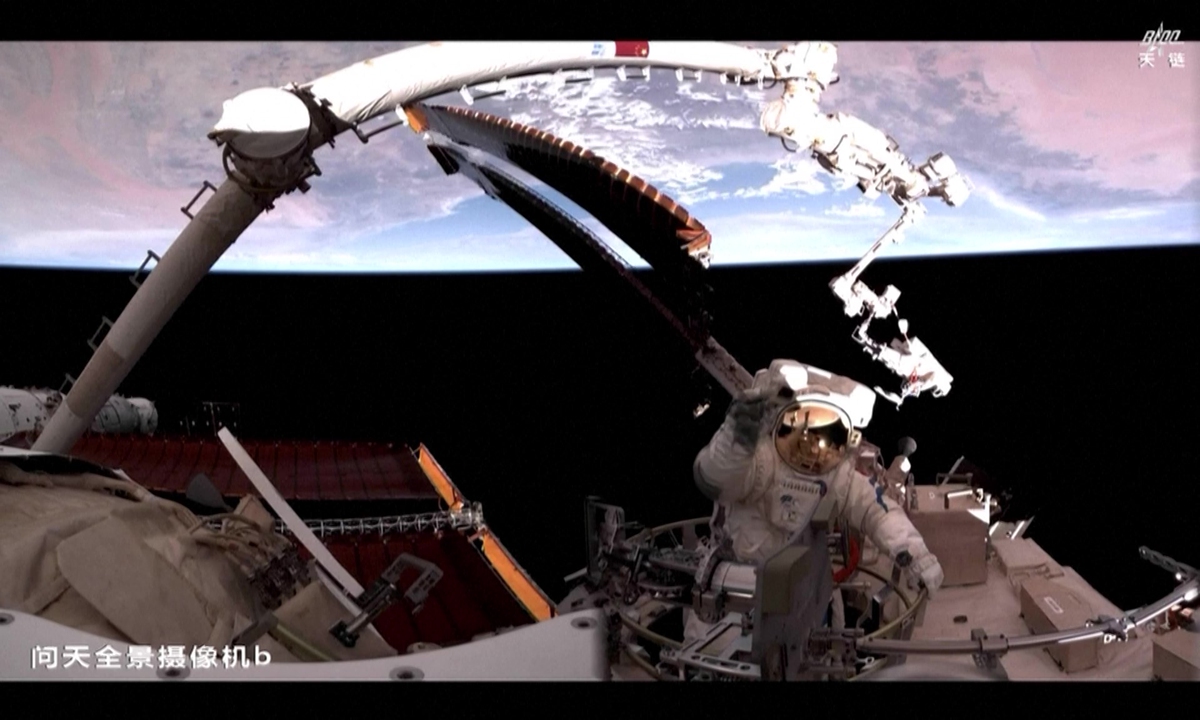Payload specialists from HK, Macao included in China's taikonaut pool for first time
Set to play key roles in country's future manned lunar landing program: experts

A taikonaut of the Shenzhou-18 crew is doing spacewalk outside China's orbiting space station on May 28, 204. According to the China Manned Space Agency, the crew members on board the space station have completed their first spacewalk on the day. Photo: VCG
As China announces the inclusion of, for the first time in history, payload specialists from Hong Kong and Macao special administrative regions (SARs) into the country's taikonaut pool, experts and local media said there is high hope that they will play key roles in China's future manned lunar landing around 2030, highlighting the significance that central government attaches to the SARs' scientific research capabilities and strong support for youth development in these regions.
The China Manned Space Agency (CMSA) announced on Tuesday that a total of 10 candidates have been selected for China's fourth group of taikonauts, including eight space pilots and two payload specialists respectively from Hong Kong and Macao special administrative regions. This marks the first time that experts from the two regions have been chosen, the CMSA announced.
John Lee, Chief Executive of the Hong Kong Special Administrative Region, told a press conference on Tuesday that it marks "a glorious moment" in Hong Kong's history as it is the first time a local resident had been selected as a payload specialist as part of the national space program, with the opportunity to travel to space.
Lee said this move highlighted the country's emphasis on the scientific research and development of Hong Kong, and demonstrates the determination and perseverance of Hong Kong youth to achieve their dreams.
The Macao SAR government said Tuesday that the central government's recognition "sends a powerful message of encouragement" to the local youth. It is committed to actively promote the city's space technology and its integration with other sectors, so as to facilitate Macao's high-quality economic development.
Although the identities of the payload specialists have not been made public, Hong Kong media reported that last June, when Lee met with the candidates from Hong Kong who had proceeded to the final round of the taikonaut selection in Beijing, photos from the meeting showed that several of them were female.
Some Hong Kong media reported that this very first Hongkonger to join the nation's manned space endeavor could be Lai Ka-ying, a female chief inspector of the Hong Kong Police Force. She holds a doctoral degree specializing in information technology and computers, hk01.com reported. However, the information has not yet been confirmed by authorities.
The primary consideration for including experts from the SARs into the country's space program is to enhance the sense of identification among residents in these regions. The decision also takes into account the strong academic research capabilities in these regions, particularly given their richer background in international academic collaboration, Wang Yanan, chief editor of Beijing-based Aerospace Knowledge magazine, told the Global Times on Tuesday.
Commenting on the likelihood of including the payload specialists from Hong Kong and Macao in the country's future manned lunar landing around 2030, Wang said "it is entirely possible."
"The fourth group of taikonauts will be ready for flight around 2030, which is exactly the time that indicates a crucial point in China's manned lunar landing schedule," Wang explained. Furthermore, Chinese are preparing for the establishment of a permanent research center on the Moon, and it will definitely need payload specialists to complete relevant tasks there, which could put the candidates from Hong Kong and Macao in key positions, he noted.
Hong Kong Legislative Council member Elizabeth Quat, who has long been an advocate for the development of science and technology innovation in Hong Kong, told the Global Times that becoming a taikonaut is a childhood dream for many people. Now, with the nation opening up the selection process for the manned space program to Hong Kong residents, they can have the opportunity to become taikonauts. This fully demonstrates the strong talent pool and technical level of Hong Kong's scientific research community.
Echoing her words, Yang Yuguang, vice chair of the Space Transportation Committee of the International Astronautical Federation, told the Global Times on Tuesday that the universities in the Hong Kong and Macao are ranked relatively high in the world, with a strong foundation in scientific research. Therefore, it is natural for more residents from the two regions to participate in China's aerospace activities.
"Their selection enriches the diversity of China's manned space taikonauts team, and will further promote the development of China's aerospace technology," Yang said.
Elizabeth Quat also stated that the inclusion of a Hong Kong payload specialist in the country's taikonauts candidates reflects the central government's care for Hong Kong and is also an encouragement for Hong Kong's scientific community. She hopes that in the future, Hong Kong will have more opportunities to contribute to the nation's space exploration efforts.
China launched the recruitment for the fourth group of taikonauts in October 2022. The SAR government has received 120 applications for the payload specialist position. Of these applicants, 60 percent were male and 40 percent female.
The professional backgrounds of the 120 applicants were highly specialized, with over half from fields such as biology, medicine, biomedical engineering, mechanical engineering, and electronic engineering. Other candidates had expertise in physics, materials science, chemistry, psychology, and astronomy.

